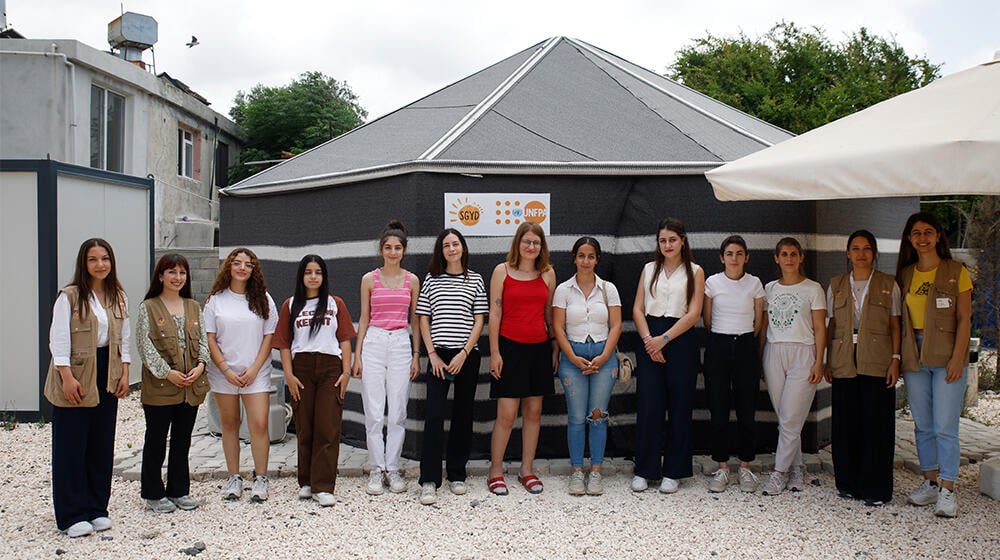One and a half years have passed since the February 6, 2023 earthquakes. The devastating impacts and needs that emerged after the earthquake, which directly affected approximately 9.1 million people in 11 provinces, continue. After the earthquakes, 3.6 million people lost their homes, and currently, around 670 thousand people continue to live in temporary settlements. Approximately 1.1 million young people are in the region, who are among the most vulnerable groups. In cooperation with the Young Approaches to Health Association (YAHA) and with the financial support of the US Government, the United Nations Population Fund (UNFPA) Türkiye, continues to work in empowering young people in Hatay, the hardest hit province by the earthquakes. Young people tell more.
HATAY, TÜRKİYE - Difficulties of living in containers, issues of privacy and private space, problems in accessing health and protection services, along with employment, lack of adequate space to socialize and study, the persisting fear, anxiety, and depression caused by the earthquakes, and much more… Approximately 1 million young people living in the earthquake region still face difficult conditions. UNFPA Türkiye has been on the ground since day one after the disaster to support young people in Hatay, one of the hardest hit provinces by the earthquakes. Let's hear from the young people about their ongoing needs and how they endure all these difficulties.
Beste (18) experienced the tremors in Samandağ, Hatay, and currently lives in Samandağ under inadequate conditions in a container with her family. Their struggle continues with the great trauma they experienced 1.5 years ago, during the earthquakes. Beste states that young people need both social activities and psychological support in the recovery process, and talks about the support she received from UNFPA supported Youth Center and she adds how the events she attended were supportive for her: “Everyone has had psychological problems after the earthquakes. However, when we feel distressed, we are actually hesitant to tell each other because other people are already suffering. There's not many places to go, and it's not easy to socialize. "When you talk to the psychological counselors here and participate in the events, you gain some self-confidence," she says, while smiling for the very first time.
Another aspect in the story of Beste is that she is among thousands of young people preparing for the university exam under difficult conditions in the region. She describes the lack of places to study as one of the important problems they encounter. “Since we stay in a small container with my family, it is a little difficult to study. It is not easy to find a place to study outside, either. There are mostly paid libraries here, and we are afraid to go because these are multi-storey buildings," she says, and adds: "This center is actually a place where we can escape from all this chaos.
Gamze is another young girl who also mentions the need of free spaces for young people to study. She comes to the UNFPA supported Youth Center with her sister. Stating that their hygiene needs continue even though 1.5 years have passed after the earthquakes, Gamze emphasizes that the dignity kit she received from the center is very useful and continuation of this support is essential for them. Gamze, who participated in the awareness sessions and social events held at the center, says that she has become stronger with what she has learned in this process: “I am learning a lot of things here. For example, I learned a lot about gender equality, the training program helped me a lot, this place gives us joy.”
Cansel (26) also experienced the earthquake in Samandağ, Hatay. After the earthquakes, she stayed in a tent with her family for nine months. She says that one of the most important problems they are currently experiencing is that they cannot find places to socialize at times when they need it most to recover. UNFPA supported Youth Center in Samandağ can meet this need to some extent, as she puts it. She explains that enjoying psychosocial support, meeting with young people who have similar experiences and difficulties, chatting, and participating in social events are very good for her. “We came here. Sometimes we watched movies, sometimes we chatted. We also had the chance to receive psychological support. “These were great, because there is almost no other place where we can do these.”
Ezgi (21), another young girl from Hatay Samandağ, is a freshman at a university. She experienced the earthquake with her family of eight. Due to the heavy damages inflicted to their home, she and her family lived in tents for a long time. Ezgi, like the other young girls, states that she needed psychological support after the earthquake. “Normally I'm a really strong person, but after the earthquake, I was thinking about the worst every night while I was sleeping, and I wasn't feeling psychologically stable.” Ezgi, who received counseling services on reproductive health and psychosocial support at our Youth Center, says that she is in constant contact with the teams and mentions that she goes to the center regularly and participates in events. “They are in constant communication with us and I feel much more comfortable.” Ezgi says that she also received a female dignity kit from the Youth Center team, and that she meets with the nurse when she has problems such as menstrual irregularity.
Beste, Gamze, Cansel, Ezgi and hundreds of thousands of other young people continue to live under difficult conditions in the earthquake zone. UNFPA continues to provide health and protection services with the financial support from the US Government in order to support the empowerment and recovery of the youth in the region. #WeWillRecoverTogether.
Recovering together with the youth in Hatay


